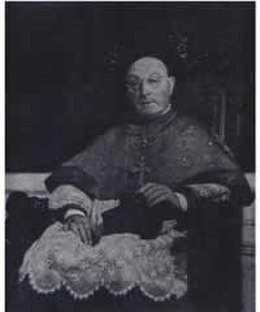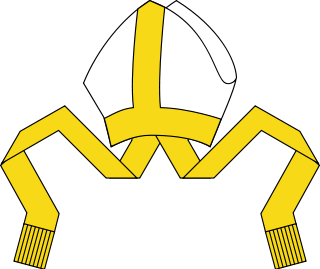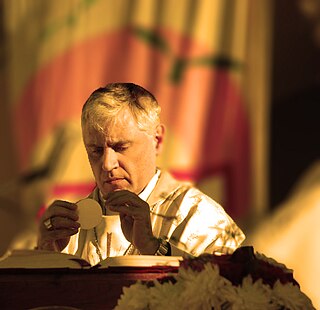Related Research Articles

Ginés González García is an Argentine medical doctor who served twice as the country's Minister of Health under President Alberto Fernández, from 2019 to 2021, and under the successive presidencies of Eduardo Duhalde and Néstor Kirchner, from 2002 to 2007. A specialist on public healthcare, González García also served as Argentine Ambassador to Chile from 2007 to 2015.
Carmelo Juan Giaquinta was an Argentine bishop, formerly the Archbishop Emeritus of the Diocese of Resistencia.
The first conflicts between the Roman Catholic Church and the Argentine government can be traced to the ideas of the May Revolution of 1810. The Tribunal of the Inquisition was suppressed in the territories of the United Provinces of the River Plate on 1813-03-23, and on 4 June the General Assembly declared the state "independent from any ecclesiastical authorities existing outside its territory".

Enrique Ángel Angelelli Carletti was a bishop of the Catholic Church in Argentina who was assassinated during the Dirty War for his involvement with social issues.
Miguel Esteban Hesayne was an Argentinian Roman Catholic prelate. He served as Bishop of the Diocese of Viedma from 1975 to 1995. He was born in Azul, Buenos Aires on 26 December 1922. He was ordained as a priest on 12 December 1948. He was appointed bishop of Viedma, Río Negro, on 5 April 1975, ordained on 4 June and installed on 8 July of the same year, at the age of 52.

Antonio Caggiano was an archbishop and a cardinal of the Roman Catholic Church in Argentina. He played a part in helping Nazi sympathisers and war criminals escape prosecution in Europe by easing their passage to South America.
Father Alberto Ángel Zanchetta was Secretary and General Chancellor of Ordinariato Castrense of Argentina.

Thomas Vose Daily was an American prelate of the Roman Catholic Church who served as bishop of the Diocese of Brooklyn from 1990 to 2003.

Brendan Kelly is an Irish prelate of the Roman Catholic Church who currently serves as Bishop of Galway, Ireland. He was installed as Bishop of Galway on 11 February 2018.
Leonardo Morizio Domínguez was an Argentine former Roman Catholic priest who was the first archbishop and primate of the Argentine Catholic Apostolic Church (ICAA), an independent Catholic Church in Argentina.

The Catholic Diocese of the Australian Military Services, is an military ordinariate of the Roman Catholic Church immediately subject to the Holy See. It was established in 1969 and maintains its Chancery office in Canberra, ACT. It is a Diocese in its own right and not governed under any Diocese or Archdiosese
The Military Bishopric of Argentina is a military ordinariate (pseudo-diocese) of the Roman Catholic Church for the Argentine (para)military forces.

Frank Richard Spencer is an American Roman Catholic bishop. Formerly a priest of the Archdiocese of Baltimore and a U.S. Army chaplain, he was appointed an auxiliary bishop of the Archdiocese for the Military Services by Pope Benedict XVI on May 22, 2010. He currently serves as the Vicar for all military Chapels in Europe and in Asia for the Archdiocese.
Stanley Joseph Ott, S.T.D., was an American prelate of the Roman Catholic Church. He served as Bishop of Baton Rouge from 1983 until his death in 1992. Stanley Ott was the cousin of Mel Ott and celebrated the Funeral Mass for Elmo Patrick Sonnier, a convicted murderer who was buried in a grave plot normally reserved for nuns.

James Francis Checchio is an American Roman Catholic prelate. Bishop Checchio served as rector of the Pontifical North American College in Rome from 2005 until 2016. On March 8, 2016, Pope Francis named him Bishop of the Diocese of Metuchen to succeed Bishop Paul Bootkoski. He was consecrated and installed as Bishop of Metuchen on May 3, 2016.

Oscar Sarlinga is an Argentinian bishop, born in Buenos Aires city on May 20, 1963. He did his primary studies at Nuestra Señora de Luján School, in San Andrés de Giles, and secondaries in Fray Mamerto Esquiu School, in that same city. He has also a degree in French Language Studies at the Alliance Française of Buenos Aires, Italian Language and Literature from Dante Alighieri Academy and several other languages, Italian, French, German, Romanian, Greek, Portuguese, Arabic, Danish and Yiddish including Native proficiency in English.
Robert Herman Flock is an American prelate of the Roman Catholic Church who serves as bishop of the Roman Catholic Diocese of San Ignacio de Velasco, Bolivia.
Rogelio Ricardo Livieres Plano was an Argentine prelate of the Catholic Church who was Bishop of Ciudad del Este, Paraguay, from 2004 to 2014.

The Secretariat of Comprehensive Policies on Drugs is a secretariat of state of the Argentine National Executive reporting to the Chief of the Cabinet of Ministers, tasked with assisting the population on drug use prevention and the treatment of drug addiction.
Julio César Martín Trejo is a Mexican Anglican bishop. He has been the diocesan bishop of the Anglican Diocese of the Southeast, of the Anglican Church of Mexico since March 2020. He has been one of only two bishops mainline historical churches who have fully supported gay civil rights in Mexico: he has openly and publicly supported civil rights for the LGBT community in the territory covered by his diocese by participating in gay pride celebrations leading delegations of local Anglican priests and laity, and calling civil authorities to follow through the Supreme Court resolution declaring all laws discriminating against LGBT people unconstitutional Bishop Martin expressly asked the secular authorities to respect the Federal Supreme Court's decision and legalise gay civil marriage. His diocese also spoke out against hate crimes against LGBT people and others. Bishop Martin has also proposed a draft version for the blessing of same-gender couples, though the policy is in discussion and not yet approved. Other clergy in Bishop Martin's Diocese support LGBT inclusion in the Church. He has as well been a vocal supporter of progressive policies against which all other national churches are. He has taken part in public demonstrations in support of families of kidnapped and missing persons; has commemorated the students massacred in Plaza de las Tres Culturas in mexico City in 1968; and has given spiritual support to sexual workers in down town Mexico City. He is also a supporter of the traditional state policy of separation of church and state entrenched in the Mexican constitution.
References
- ↑ "Antonio Baseotto". Catholic-Hierarchy.org . David M. Cheney.[ self-published source ]
- ↑ Página/12, 6 March 2005. “Si la pornografía es negocio, el hebreo vende pornografía. Y si la droga es negocio, vende droga”.
- ↑ La Capital, 18 February 2005. El obispo castrense sugirió que "tiren al mar" al ministro de Salud.
- ↑ Página/12, 19 February 2005. Merece “que lo tiren al mar”.
- ↑ Catholic News Agency, 21 March 2005. Argentine government withdraws recognition of bishop.
- ↑ BBC News, 19 March 2005. Bishop sacked in abortion dispute.
- ↑ Compass Direct, "News of Christians worldwide who are persecuted for their faith", 24 March 2005. President fires controversial Catholic bishop Archived April 15, 2005, at the Wayback Machine .
- ↑ AICA (Argentine Catholic News Agency), 15 May 2007. Benedicto XVI aceptó la renuncia del Obispo Castrense.